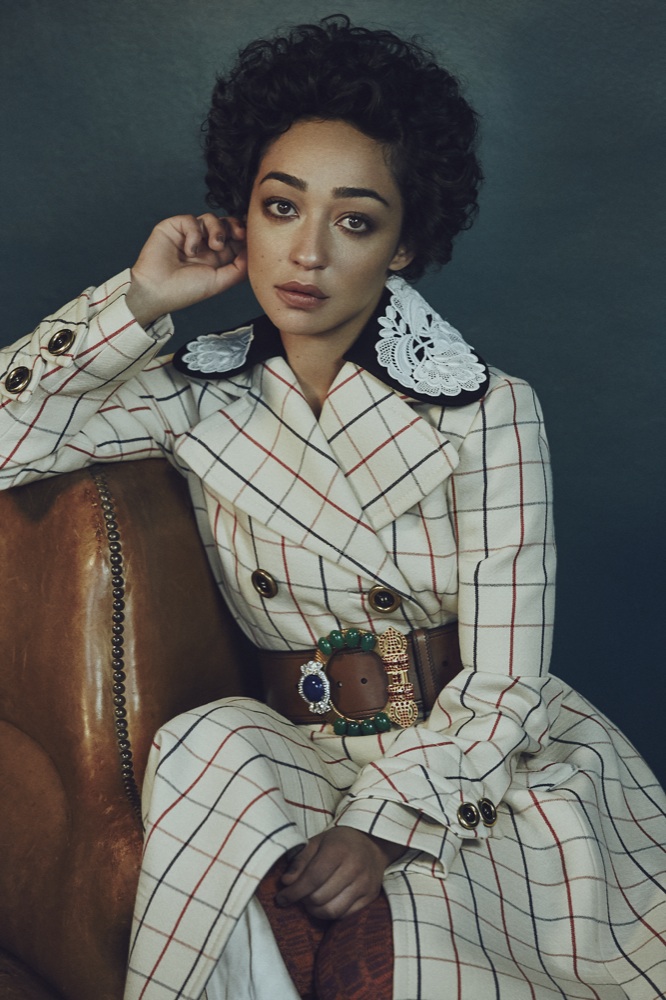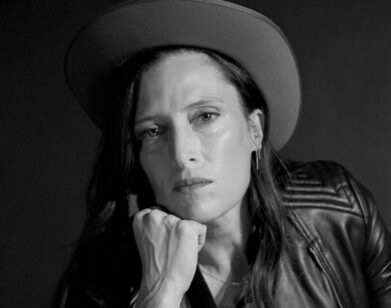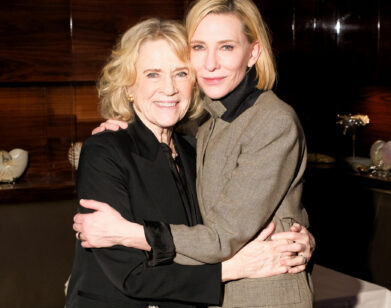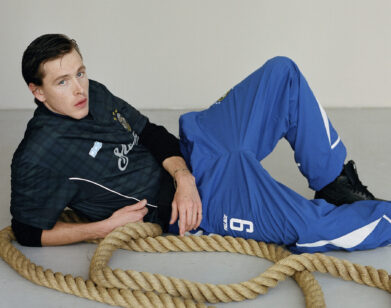Ruth Negga
RUTH NEGGA IN THE CARDINAL’S QUARTERS AT REDBIRD, LOS ANGELES, JUNE 2016. PHOTOS: ZOEY GROSSMAN/ART DEPARTMENT. STYLING: DANI + EMMA. HAIR: NIKKI PROVIDENCE/FORWARD ARTISTS USING FREE YOUR MANE. MAKEUP: SAMUEL PAUL/FORWARD ARTISTS USING MARC JACOBS BEAUTY. MANICURE: STEPHANIE STONE/NAILING HOLLYWOOD USING MAC STUDIO NAIL LACQUER IN COFFEE BREAK.
Tulip, Ruth Negga’s character in AMC’s television adaptation of the popular DC Comics story Preacher, is a woman who knows her mind, knows how to build a bazooka out of soup cans, and knows how to talk to young children. As the ex-girlfriend of protagonist Jessie Custer (played by Negga’s real-life boyfriend Dominic Cooper), we’re not yet familiar with all the details of Tulip’s past, but we know that she grew up in a brothel and was, at one point, involved in robbing banks. Perhaps the most obvious and succinct way to describe her is as a “badass.”
For Negga, however, it was Tulip’s “sweet naivety” that first attracted her to the role. “When she detains the kids [in the pilot] and is like, ‘This is how you make a bazooka,’ it’s not in any threatening, weirdly egotistical way,” the Irish actor explains over the phone. “It’s like she’s showing them how to use watercolors for the first time,” she continues. “I really like that kind of oddness. Everything seems straightforward in Preacher but nothing is; everything is kind of askew. You’re dealing with this hyper unrealness—that’s what comics are—and I like that sort of twist.”
Thus far, 2016 has been a pivotal year for Negga. At Cannes, reviewers gushed over the 33-year-old’s performance in Jeff Nichol‘s Loving. Co-starring Joel Edgerton, the film follows the true story of Mildred and Richard Loving, an interracial married couple living in the deeply segregated South of the 1950s. Last month Preacher debuted on AMC to an equally positive reception. While critics were less kind about the ensemble blockbuster Warcraft: The Beginning, in which Negga played Lady Taria, it is the most lucrative videogame-to-film adaptation to date.
Raised in Limerick, Ireland, and educated and Trinity College in Dublin, Negga is by no means an overnight success. Rather she made her feature film debut opposite Cillian Murphy in Neil Jordan’s Breakfast on Pluto (2005) and won the Berlin International Shooting Star award in 2006.
EMMA BROWN: When did you first hear about Preacher?
RUTH NEGGA: My agent sent me the script. I didn’t even know that they had attempted to make it several times. It wasn’t really in my orbit. I knew about the comics, but I wasn’t really familiar with them. It was about March, April last year that I got the script.
BROWN: Did you have to go in and do several rounds of auditions and screen test and all that?
NEGGA: Yeah. I don’t know how many times I auditioned, but it was quite a few. I suppose you’re commissioned for essentially seven years—that’s what they do in America, they option you—so they want to get it right. If they’re going to spend seven years with you, they want to make sure you’re the right person.
BROWN: Is it frightening to sign up for project that could potentially last for seven years?
NEGGA: I think part of the reason people become actors is so that they don’t have to spend seven years doing the same thing. Once you become familiar with it, the concept might be a bit frightening, but if it’s a show you love, like with Preacher, I hope it goes for seven years. I think it’s brilliant. I love my character and I enjoy the show and the writers and the producers. If it was a nightmare show I’m sure it would be a bit scary, but I had no qualms about signing up or being optioned for it because it’s so intelligent.
BROWN: At what point did you know that Dominic was going to be involved? Did you read the script together?
NEGGA: He stole my script. [laughs] When put I myself on tape, he read opposite me, but I’m not sure now who got cast first.
BROWN: You’ve worked with each other three or four times now.
NEGGA: Yeah, we first worked together on a play in 2009 at the National Theatre in London—Phaedra—with Helen Mirren. That was amazing. We first met on that play.
BROWN: What about with Warcraft?
NEGGA: People don’t believe us, but it is a weird coincidence. I understand why people don’t believe that.
BROWN: Evan Goldberg, Seth Rogan, and Sam Catlin co-developed the show, and I know they directed a few episodes as well. Did it feel very different having Seth or Sam or Evan direct you than someone who comes in for one episode?
NEGGA: Seth and Evan directed the first one, so I think they were easing us in. It’s like mummy and daddy staying for the first few days of summer school and then leaving, just to make it less terrifying. [laughs] We all really enjoyed Seth and Evan’s energy; I think that was very clever because we’d become quite familiar with them and we knew that both of them had cast us, so they were happy with all of us, so that made it so much less daunting. Once we had those two first episodes out of the way, we found our feet.
BROWN: One of your breakout roles was Breakfast on Pluto and I heard that Neil Jordan rewrote the part for you after seeing you in a play.
NEGGA: Kitten and Charlie are outsiders, so I think me being mixed race was just added to that in the story. I think he put a lot of nuances into the story just to reflect that. To be honest, when I read Patrick McCabe’s script, I thought, “Oh my god, she’s actually perfect. It would be brilliant if she was mixed race.” It would fit in with them before, because of the nature of their rejection at that time. So they did change certain aspects that weren’t in the book.
BROWN: Have you ever been put off by a character’s physical description in a script?
NEGGA: Oh yeah. I fucking hate the world “beautiful.” Sorry, I shouldn’t be swearing. I just hate the word “beautiful.”
BROWN: Have you seen that Twitter account where they quote the first line of all the female character descriptions they come across in screenplays, and it’s just “Beautiful, but mysterious” over and over again?
NEGGA: No I haven’t. That’s a relief that people are noticing it and trying to fight against that shite! It may sound lame, but it’s such a static word. It doesn’t do anything. It’s not helpful in its descriptive nature. There are no actions involved in “beautiful.” It’s such an inactive thing and it’s so subject to each individual’s taste and appreciation. It’s a lovely word, but I feel like it’s been hijacked by really boring, dull people who don’t understand how to use words.
BROWN: I like that way of putting it. Have you ever had to really fight for a role?
NEGGA: Ninety percent of my roles, I’ve had to fight for. It’s only a really small percentage of people who get handed roles. But that can be quite scary. The good thing about auditioning is that you get to test yourself and see if you can play this character—you’re also auditioning yourself. I enjoy seeing what the chemistry is between the people you might be working with. It’s not all bad having to audition, there can be benefits.
BROWN: Have you ever auditioned for a character that you really liked on the page, but once you did the audition, you realized you just weren’t a good fit for the role?
NEGGA: I try and damage control before you have to go in and read with anybody. I’ve done that a few times where I’ve been honest with myself: reading out loud or exploring that character in the safety of my bedroom and then realizing that it’s not going to work. While I’m not limiting myself through fear, I think it’s interesting when you know instinctively or you have an energetic response to something and realize that someone else would be better.
BROWN: I wanted to talk about Loving. It’s the first film that Jeff Nichols has written and directed that is based on true events rather than an original idea of his. Did it feel like a new territory for everyone?
NEGGA: Jeff works with a lot of the same people on his films—his cinematographer Adam Stone, his art production designer Chad Keith, and his editor Julie Monroe—so you’re entering into this familiar, family territory, where everyone is quite comfortable with each other and there’s sort of a shorthand. In many ways, the set was a really quiet, gentle place. Jeff is so good at writing, and he’s had a lot of practice, and I think he’s managed to sort of have a tone that’s all Jeff—that signature tone. He’s a writer who makes sure he doesn’t get in the way of his own writing in terms of too many words. Every single one of his films, they’re about different things, but they have the same beautiful energy. I think he brought that kind of quiet, magnetic energy to the Loving story. If you told that story in a humdrum, biographical way, I don’t think you would do them justice. What he manages to do is elevate the everyday to the tone it actually deserves, without being overly reverential or too frightened to explore this couple. There’s sort of a glow about this film, without there being a halo.
BROWN: Are you someone, or is Jeff someone, that likes to do a lot of takes?
NEGGA: I’m definitely not. There’s only one scene where I remember doing a few takes. Jeff knows what he wants, there’s no hemming and hawing. He might have a think about something, but it’s not out of being unsure. In that kind of environment, you become quite sure of what you want. He creates this sort of a fine-tuning accuracy that’s in the air. There’s not much chatter. He’s able to tune into all the various people’s wavelengths. He can tune into the actors’ wavelength, the cinematographer’s. He’s this master of wavelengths. But I think the best things often happen when you just take the plunge and you do it a couple of times.
BROWN: I was watching some of your Cannes interviews, and you mentioned that you’d seen the documentary The Loving Story. Was that before you heard about Jeff’s film or because you’d hear about it?
NEGGA: I’d seen it a couple of years before I got the script. Now, I’ve seen it so many times, but I knew about the case and I recognized the footage. It’s Nancy Buirski’s documentary and I know it off by heart now. It was absolutely invaluable for creating. I auditioned for Loving two years before we started shooting, so in the hopes that I would be playing Mildred, I watched it again. Also it’s one of the best documentaries I’ve seen. I found this couple interminably fascinating; even if I didn’t get the part, I just wanted to know more about them and their story. It’s one of many stories that hasn’t been told that now is being told, and that’s really important to all of us involved.
PREACHER AIRS SUNDAYS ON AMC. WARCRAFT IS CURRENTLY IN THEATERS. LOVING COMES OUT THIS NOVEMBER.







